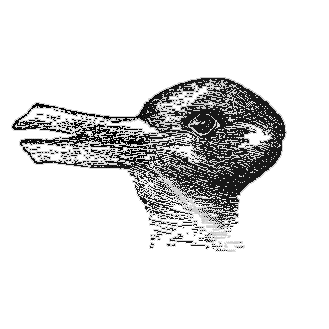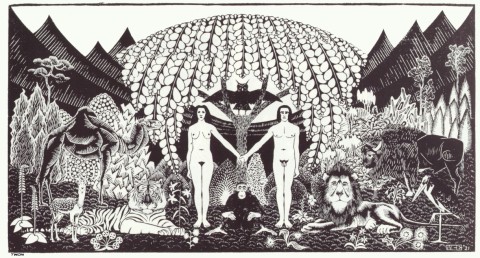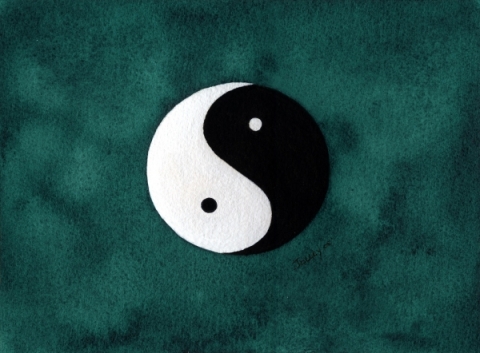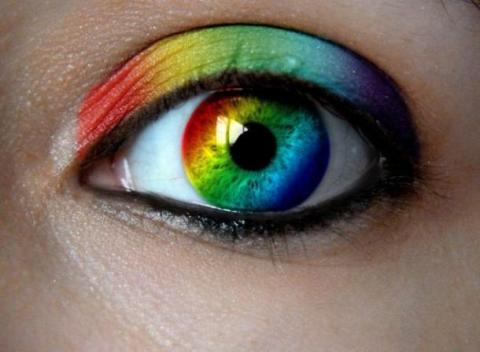Polarity and Paradox: Black and White Thinking in a Rainbow World
February 8, 2012 § 27 Comments
“To offer the leadership and vision, our times require as individuals, professionals, change agents in any domain, and even as spiritual leaders, wisdom dictates we move beyond unconscious polarization – not just intellectually, but in the very words we speak and the actions we take.” ~ Ragini Elizabeth Michaels
“[T]he thinker without the paradox is like the lover without passion” ~ Soren Kierkegaard
“To set up what you like against what you dislike is the disease of the mind.” ~ Jianzhi Sengcan
If one extreme presents itself, such as a predator, it’s logical to put as much space between you and that danger as possible—to go the opposite direction. It makes sense to label the saber tooth tiger “unsafe” and the cave where he can’t reach you “safe.” In situations so basic, locations which are “somewhat safe” are ineffective to ponder.
But we no longer live in an age where this kind of thinking serves us. In fact, the cognitive distortion brought on by viewing a complex world through the reductive lens of “this or that,” “all or nothing,” “either/or,” can harm relationships, diminish well-being and limit our overall understanding of the world. In viewing a multi-faceted situation through a binary lens we are bound to miss essential details.
In the modern era the ability to perceive nuance, ambiguity and paradox is considered the height of cognitive vitality. Finding balance between seemingly contradictory elements is believed by many to be the road to inner peace.
Language itself promotes dualistic thinking. ‘Difficult’ and ‘easy’ define each other. What would ‘calm’ mean without ‘anxious?’ ‘Up’ makes ‘down’ distinguishable.
Even the simplest, most everyday question — “How are you?” — pressures us to pick a side. Are you feeling good? Bad? Which is it?
Yet, our lives at all times contain both pleasant and uncomfortable aspects.
Middle-ground responses provoke an interpretation veering towards the negative. For instance responding with a shrug, “I’m okay,” or the unlikely but far more accurate, “I’m both good and bad,” will be read as unspecific and inspire detail pressing. The most honest answer (“I am”) would be considered highly uninformative.
“While we speak to the unity and harmony of the whole as our desired goal,” writes Ragini Elizabeth Michaels in her article “Managing a Paradoxical Life,” “our language itself too often reveals an unconscious choice of one pole of a polar pair as more important, or more right, than the other – spiritual over material, peace over conflict, trust over doubt, unity over diversity, harmony over discord.”
A false dilemma (also called a false dichotomy or black-and-white thinking) is a type of logical fallacy that involves a situation in which only two alternatives are considered, when in fact there are additional options. (“It wasn’t medicine that cured Mrs. X, so it must be a miracle.”)
Marked by a logical leap and the oversimplification of a more complex matter, a false dichotomy may be presented intentionally, in order to manipulate a perspective (“You’re either with us, or you’re against us,”) or unintentionally, due to an assumption (“He wouldn’t do that if he loved me.”)
Social systems reinforce this kind of polarized thinking. For example, if you want to identify with a political party of any influence in the United States you have two choices: either you can identify as belonging to a party that is pro-peace, pro-gay, pro-tax, pro-regulation, pro-choice and anti-gun, or pro-military, anti-gay, anti-tax, pro-free market, pro-life and pro-gun.
What if you are pro-gay, pro-free market, anti-tax, pro-life, pro-peace and pro-gun? Too bad. Pick a side or your vote yields no power. Cultural splitting such as this encourages people to think in unnecessarily polarized terms.
In structuralism (the sociological study of cultural context) dividing the world into two opposing categories, known as binary opposition, is seen as a fundamental organizer of human philosophy, culture, and language (for example, we need the idea of “evil” in order to conceive of the concept of “good.”)
But others (post-structuralists in particular) argue that such binary opposition is often value-laden and ethnocentric.
French philospher Jacques Derrida agrees that binary oppositions often mark “a violent hierarchy” where “one of the two terms governs the other.” In this way, binary language can be linked with oppression.
“Black and white thinking doesn’t just hurt ourselves, but also the relationships we try to build with other people,” notes psychology writer Steven Handel. “When we view the world in strict and over-simplistic terms, we are less likely to compromise and cooperate with others to meet common interests.
“We lose in black and white thinking because we are never going to be everything we want to be. We’re always going to be lacking something if we’re trying to measure ourselves on some black-and-white scale where x is good and y is not good. We’re never going to be able to be completely x. It doesn’t happen, because we’re human – we’re unfinished – and we’re not simple.”
“A black and white viewpoint often creates artificial ‘needs’ in our life that lead to disappointment and depression,” continues Handel, adding that the cognitive-based psychotherapist Albert Ellis called one example of this ‘musterbation.’ “This is our tendency to think that we must have something, or we must do something, or life must be a certain way – or it will be awful.
“Black and white thinking doesn’t open us up to the possibility that even if life doesn’t work out exactly the way we think it should, we can still find happiness.”
Ragini Elizabeth Michaels agrees: “We may think that by eradicating the pole we don’t want, we are creating a non-dual universe, or ‘fixing the problem.’ We may believe that the dilemma, or duality itself, with its conflicts and tensions, will then somehow disappear. Or worse yet, we may begin to perceive the spiritual as the solution to the problems of the material world – which, paradoxically, it is and it is not.
“In contrast, depolarizing the mind frees us to perceive war and peace, anger and compassion, freedom and responsibility, and even duality and non-duality, as partners, and to perceive the friction or tension between them as creativity in disguise. This shift in perception changes everything.”
 German philosopher Hegel saw history as a merging of opposites, creating progress: one viewpoint (the Thesis) merges with another, seemingly polar, viewpoint (the Anti-Thesis,) creating a new entity altogether, the Synthesis. This process is known in philosophy as the Hagelian Dialectic. For Hegel, dialectic tension is inherently creative and capable of union.
German philosopher Hegel saw history as a merging of opposites, creating progress: one viewpoint (the Thesis) merges with another, seemingly polar, viewpoint (the Anti-Thesis,) creating a new entity altogether, the Synthesis. This process is known in philosophy as the Hagelian Dialectic. For Hegel, dialectic tension is inherently creative and capable of union.
Great thinkers have always embraced paradox — looking past black and white simplification into a world where seemingly contradictory forces can co-exist. Kierkegaard said:
“…one must not think ill of the paradox, for the paradox is the passion of thought, and the thinker without the paradox is like the lover without passion: a mediocre fellow. But the ultimate potentiation of every passion is always to will its own downfall, and so it is also the ultimate passion of the understanding to will the collision, although in one way or another the collision must become its downfall. This, then, is the ultimate paradox of thought: to want to discover something that thought itself cannot think.”
Ancient Eastern mystical philosophy contains the concept of yin yang (referred to in the West as “yin and yang”), which describes how seemingly contrary forces are interconnected and interdependent in the natural world, giving rise to each other in turn. Yin yang are not opposing forces but complementary opposites that interact within a greater whole.
Paradox is the heart and soul of Zen philosophy. As Lau-Tzu said, “If you want to become full, let yourself be empty…Look, and it can’t be seen. Listen, and it can’t be heard. Reach, and it can’t be grasped… seamless, unnamable, it returns to the realm of nothing. Form that includes all forms, image without an image, subtle, beyond all conception…You can’t understand it, but you can be it. The Tao is beyond is and is not…”
Next time you find yourself feeling anxious over some perceived reality, take note. Are you making a logical leap that if X is true, then so must Y? Are you boxing yourself or someone else into an all-or-nothing false dilemma, considering only two alternatives where there are many? Ignoring seemingly contradictory aspects in order to create the illusion of a more manageable whole? In the end, the dualistic worldview is not more manageable. It is more prone to distortion.
Am I saying to abandon discernment? On the contrary! By releasing preconceived dualistic notions we open ourselves to perceive a greater spectrum.











This is really great. Pretty much sums up my fall semester in a single entry! Thank you for your thoughts.
Thank you, Katie! I’m thrilled it hit home. 🙂 Been on my mind as well.
Best!
Tai
Well written and gathered! Thank you 😀
Thank you for your kind note! 🙂
Reblogged this on TropicalTruth and commented:
A must Read
I see your point. I try to accept what I cannot change. Maybe the way things are is better than what I want them to be. I like your quote:
“Black and white thinking doesn’t open us up to the possibility that even if life doesn’t work out exactly the way we think it should, we can still find happiness.”
There is also the factor of serendipity:
“Serendipity. Look for something, find something else,
And realize that what you’ve found is more suited to your needs than what you thought you were looking for.”
-Lawrence Block
Another thought-provoking post.
John M
I’m linking this post to my blog.
So glad you liked the post! 🙂 It’s something I’ve been thinking about lately.
I’m not necessarily saying what you have is better than what you want — maybe what you want is really great. I know what I want and don’t have are pretty awesome things. However, I am saying, that what we have is also probably more awesome than we realize when holding it up to the yardstick of an imaginary ideal.
Maybe not better, just…equally capable of providing fulfillment, and having the advantage of, well, being right in front of us. 🙂
Be well!
Tai
I see what you mean.
Thanks for another meaningful post.
John M
😉 good!!
Thanks!! 🙂
On on,
TCW
Whether serendipity or inspiration, I like what you wrote. My mind reels with this thought. I have heard it many ways. Still something for me is missing, it feels distant.
My friend remarked the other day about I why I bother, I will never answer it. I try to say she is wrong.
I believe your friend is wrong. It’s the most important thing to “bother!”
Keep searching for that missing piece…that is the quest!
Fabulous post – as usual. I suffer from writing stuff that blurs the line between fantasy and reality. I purposely do this and people complain that they don’t know what’s real and what’s not in the stories. My writing is also designed to make them think and to use their imagination but some tell me that they need more information. They want me to tell them the answers – sigh! My stotries are taken better by people who can think in rainbows instead of black and white. May there be more rainbow thinkers in the world.
Tahlia Newland, urban fantasy author of ‘A Matter of Perception’ – quirky, surprising & thought provoking tales http://tahlianewland.com/short-stories/
I love magical realism!
They’re just being stick-in-the-muds! 😉
Keep thinking in rainbows.
~Tai
Thank you so much for helping us remember to not take ourselves so seriously when we get stuck in the right or wrong of life. There really is no right or wrong, black or white. It is not so clearly cut an if one learns to flow with that doors open.
R
I’m so glad you enjoyed the post, batgurrl. 🙂 It’s so easy to fall into black & white thinking. Our mind tends towards a reductive view of reality in an attempt to streamline, doesn’t it? Quite often to our disadvantage!
I do think there are some basic rights & wrongs of course, but we are talking basic! Physically harming another for instance is a universal wrong. But there are so very few that are black & white, and mostly we assign “right” & “wrong” to far more multifaceted subjects.
On on!
TCW
What an incredibly freeing post… like a weight lifted off… when I can comprehend what it means to stop judging and basing things as “good/bad”… I’m really trying to understand what it feels like to be the space that observes all without polarizing. Trying to put this into words is difficult, you do such an excellent job. 😉
Thank you so much, Lauren! I’m so sorry I didn’t respond to this comment earlier. I am just now seeing that I didn’t, but I definitely appreciated the positive feedback at the time, and now again, as I re-read.
I am thrilled you found this post freeing. I do think we lock ourselves up so often in this false world of black & white thinking, so often judging ourselves bad or wrong—this is our basic fear. And it is pretty much entirely a fabrication. Usually, studies in psychology imply, finding its origin in childhood misunderstandings. (For instance, the age old sense that if “mommy & daddy are fighting, I must have done something wrong.” The child’s eye view misconception of adult hardship. For help ideas about healing this aspect, check out my post “Soul Retrieval.” 🙂 https://taicarmen.wordpress.com/category/soul-retrieval-2/ )
The key to personal liberation certainly lies in freeing ourselves from the burden of feeling inadequate, when in fact we have so much power & beauty inside of us! We must just acquire the skill of setting that power free. And sustaining it as much as possible. I’m still working on that last one. 😉
On on,
TCW
Just reading some interesting thoughts on “good & bad” in this lovely writer’s blog. Thought of your comment & the thread raised therein. 🙂 http://astralcartographer.com/the-matrix-is-real/
In the field of thinking this post is a good round in culture. Yes the fundamental pattern of man didn’t distinguish between good and bad. But after he started to distinguish he started to enter a complicated state of preferring things to others and became polarized.
Yes! Agreed. I’m sorry I missed this comment when you wrote it, Abdelwahab.
You’re right, as man evolved, he became attached to ideas of good & bad…initially, this was the beginning of conscious living & ethics, potentially, but we’ve taken it too far in the modern world. And now must engage in a de-conditioning, or re-patterning, of polarizing thought patterns, and judging ourselves wrong when it is not a question of good or bad, just a matter of being multi-faceted, complex human beings.
On on,
TCW
Thank you for the post on this article. It can never be a case that one is just all good or all bad, I don’t believe it is like that. I think that we are all both good and all both bad, it is the way that human beings are. I would like to see more written on this topic if you could and wouldn’t mind.
Thank you Marie! I would love to create a follow-up post to this. It’s a fascinating subject & well worth a second post.
Apologies for not replying to your comment when you first left it—apparently I missed a few from this post at the time. But hopefully this late reply will act serendipitously for you in some way, and I will treat your recommendation for a Part 2 in the same way. 😉
On on,
TCW
Do you mind if I quote a few of your articles as long as I provide credit and
sources back to your webpage? My blog is in the very same niche as yours and my visitors would definitely benefit from some of the information you present here.
Please let me know if this alright with you. Appreciate it!
Absolutely! Apologies about the delayed reply.
Glad you enjoyed the post and please do circulate it. Credit, and a link back to Parallax if possible, is much appreciated!
On on, fellow quester.
TC
I like to disseminate information that I have accumulated
with the season to help enhance group overall performance.
Me too! Perhaps you will see fit to disseminate this. 🙂